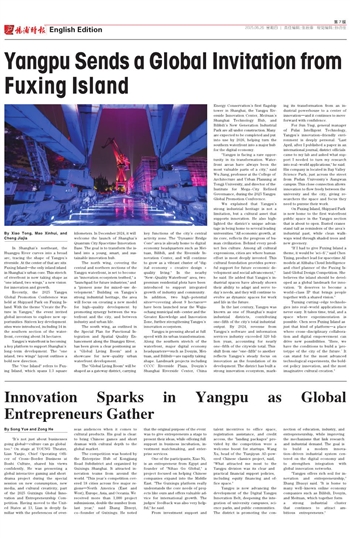By Song Yue and Zong He
"It's not just about businesses going global—culture can go global too." On stage at YOUNG Theater, Lian Yanjie, Chief Operating Officer of Cross-Border Business at Boshi Culture, shared his views confidently. He was presenting a global interactive gaming and short drama project during the special session on new consumption, new media, and cultural creativity, part of the 2025 Guixingu Global Innovation and Entrepreneurship Competition. Having moved to the United States at 13, Lian is deeply familiar with the preferences of overseas audiences when it comes to cultural products. His goal is clear: to bring Chinese games and short dramas with cultural depth to the global market.
The competition was hosted by the Enterprise Hub of Kongjiang Road Subdistrict and organized by Guixingu Shanghai. It attracted innovation teams from around the world. "This year's competition covered 18 cities across five major regions—North America (East and West), Europe, Asia, and Oceania. We received more than 1,000 project submissions, double the number from last year," said Zhang Zhuoyi, co-founder of Guixingu. He noted that the original purpose of the event was to give entrepreneurs a stage to present their ideas, while offering full support in business incubation, investment matchmaking, and enterprise services.
One of the participants, Xiao Ni, is an entrepreneur from Egypt and founder of "Nihao Go Global," a project focused on helping Chinese companies expand into the Middle East. "The Guixingu platform really understands the core needs of projects like ours and offers valuable advice for international growth. The judges' feedback was also very helpful," he said.
From investment support and talent incentives to office space, registration assistance, and credit access, the "landing packages" provided by the competition were a welcome boost for startups. Wang Xu, head of the Tianjiyun AI-powered Chinese classics project, said, "What attracted me most to the Yangpu division was its clear and practical financial support policies, including equity financing and office space."
Yangpu is now advancing the development of the Digital Yangpu Innovation Belt, deepening the integration of university campuses, science parks, and public communities. The district is promoting the connection of education, industry, and entrepreneurship, while improving the mechanisms that link research and industrial demand. The goal is to build a modern innovation-driven industrial system centered on the digital economy and to strengthen integration with global innovation networks.
"Yangpu offers rich soil for innovation and entrepreneurship," Zhang Zhuoyi said. "It is home to many well-known online economy companies such as Bilibili, Douyin, and Meituan, which together form a strong industrial cluster that continues to attract ambitious entrepreneurs."

